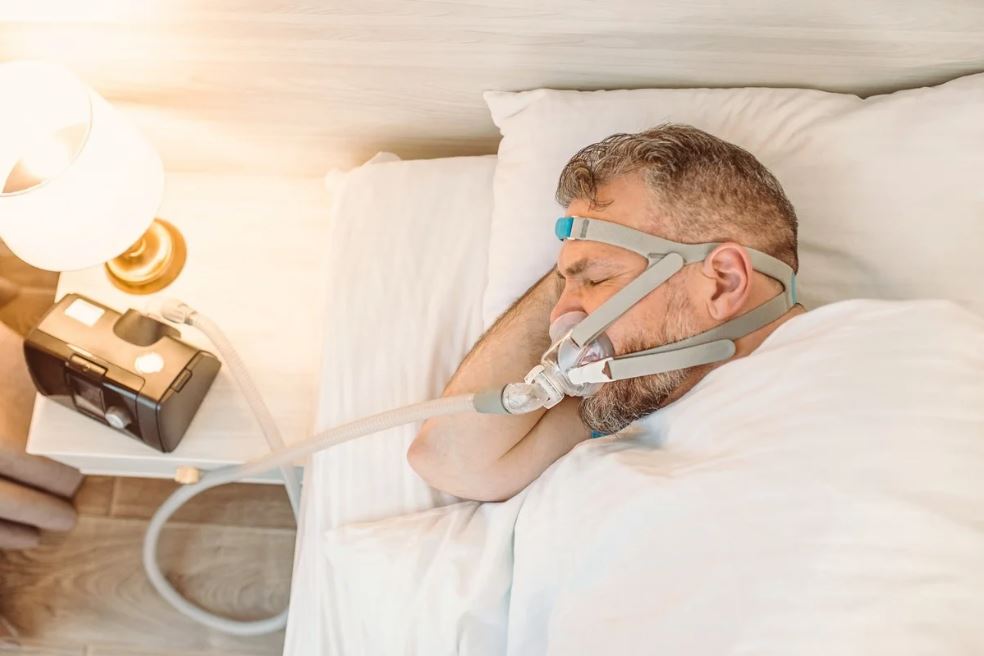How long does sleep apnea last? Although it is a typical query among those who have been diagnosed with sleep apnea, the answer is no. Although there is no known therapy for this chronic ailment, you may lessen the symptoms by making certain lifestyle adjustments and procedures.
For instance, losing weight may reduce the incidence of obesity-related sleep apnea. Learn more procedures like tonsillectomy may be performed on both adults and children, with some success notably when treating youngsters.
Understanding the underlying causes of sleep apnea and the adjustments you may make to lower your risk factors will help you comprehend this article. Additionally, it examines the potential consequences and long-term prognosis of untreated sleep apnea.
How Does Sleep Apnea Happen?
When any portion of the airway from the nose tip to the lungs contracts while a person is sleeping and prevents them from breathing, it is known as obstructive sleep apnea. As a result, the underlying anatomy of a person often plays a role. 3
Airflow might be hampered by a deviated nasal septum or swollen turbinates in the nose. The throat passageway may be blocked by a thick tongue, huge tonsils or adenoids, or a floppy soft palate.

Chronic snoring causes airway damage and vibration. The airway may become narrowed as a result of swelling brought on by this. Muscles may not be able to maintain a strong enough tone to support the airway as nerve receptors may become less sensitive.
In addition, the following factors may contribute to the development of sleep apnea:
- Weight gain, particularly when it results in a big neck
- Lying on your back as you sleep, which enables your tongue to re-enter your airway.
- Drinking alcohol, particularly in the few hours before bed
These causes result in structural alterations in the architecture of the airways, which generate a chronic illness that is often treatable but not curable.
Is obesity a factor in sleep apnea?
The main risk factor for obstructive sleep apnea is obesity, and symptoms of the condition may be alleviated by decreasing weight. According to research, obese persons who lose weight even have smaller tongues, which helps to prevent this problem with the airways. 6 However, even though its causes may be more challenging to cure in slim individuals, “skinny” persons may have sleep apnea.
Is Sleep Apnea Reversible?
The majority of the time, sleep apnea is a persistent chronic disorder. Particularly once adolescence has finished, human anatomy tends to stay set.
Children’s sleep apnea may, however, be effectively and permanently corrected. Adenoids and tonsils may be removed, and there are other allergy treatments available.
• Rapid maxillary expansion, an orthodontic procedure to enlarge the hard palate
Adults and teenagers have more surgical choices. Operation to advance the jaw has been the most effective. Up to 80% of patients who have this operation, also known as maxillo-mandibular advancement, report complete resolution of their sleep apnea.
The jawbones are reshaped, fixed in place (usually with titanium screws and plates), and the face contour is altered to enhance the airway.
The anatomy may also be altered by other surgeries, however these operations often have lower success rates.
Among these choices are:
- Septoplasty, to correct a deviated septum
- Radiofrequency ablation of the nasal turbinates, to reduce nasal congestion and blockage
- Surgery on the soft palate, such as the uvulopalatopharyngoplasty (UPPP)
- Tongue surgery including tongue anchor movement (called hyoid advancement)

What Are the Chances That Sleep Apnea Will Cause Death?
Sleep apnea may result in severe and even life-threatening complications if it is not treated. Diabetes, high blood pressure, and cardiac (heart) disorders are a few of them. As a consequence, sleep apnea may lower your life expectancy; in the United States, 38,000 individuals pass away each year from heart problems linked to sleep apnea.
Reducing the Risk Factors for Sleep Apnea
Your sleep apnea may be treated with drugs and lifestyle modifications. Exercise, weight loss, and cessation of tobacco use are all beneficial.
Your airway muscle tone may be improved by breathing exercises. According to certain research, tongue-strengthening exercises known as myofunctional therapy as well as circular breathing methods used to play the didgeridoo have favorable impacts. However, the findings are conflicting, and additional study is required.
It might also be beneficial to keep the nasal airways open by using nasal steroids to manage allergies.
Medications that might be helpful include: Rhinocort; Flonase; Nasonex (mometasone); (budesonide)
It may also be beneficial to sleep on your side or tilt the head of the bed up to 30 to 45 degrees.
Still, continuous positive airway pressure remains the gold standard of therapy for many persons with sleep apnea (CPAP).
The airway doesn’t close due to this continuous flow of air, which maintains it open. Similar to a pair of spectacles, it only functions while worn, but for those who can handle it, it may be quite effective.
Final thoughts
Although surgical therapy for youngsters (whose bodies are still developing) often produces excellent outcomes, there is no genuine cure for sleep apnea.
Adults have a permanent airway architecture, thus further treatments and interventions are needed to address the sleep apnea-related alterations. Treatment options include CPAP, surgery, and medication. A variety of lifestyle modifications, such as decreasing weight, may also help with sleep apnea symptoms.
Age and the start of menopause in biological females are two risk variables that cannot be adjusted, but there are additional risk factors that may. If you have concerns about sleep apnea, speak with your healthcare physician about your symptoms.







